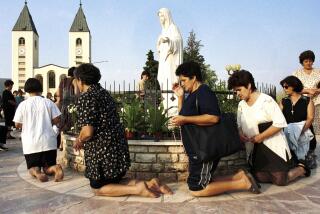Birth Stand Disappoints Some Experts
- Share via
Some doctors expressed disappointment today with the Vatican’s stand against test-tube births and surrogate motherhood but doubted that the policy would deter Roman Catholics in the United States from using such procedures.
Dr. Robert J. White, director of neurosurgery and the brain research laboratory at Cleveland Metropolitan General Hospital, called the 40-page statement “an ultraconservative document.”
White, an adviser to the Pope on medical ethics, said he discussed in-vitro fertilization and embryo transfer with the Vatican’s bioethical commission in 1984.
A Catholic and father of 10, White said he supports the limited use of in-vitro, or test-tube, fertilization by married couples unable to conceive on their own. He said the Vatican’s denunciation of in-vitro fertilization, among other infertility techniques, was “a bit of a disappointment.”
Position Expected
George Kanoti, a theologian and director of the Department of Bioethics at the Cleveland Clinic, said the Vatican’s position was to be expected.
The Catholic Church has been reluctant to accept mechanical intervention in birth and reproduction, he said, “so it’s not unpredictable they would find in-vitro fertilization, surrogate motherhood and genetic engineering as morally suspect.”
However, Kanoti said, he did not know whether American Catholics will automatically follow the Vatican’s teachings on this subject.
Gary N. Skoloff, an attorney representing a childless couple who hired a surrogate mother, Mary Beth Whitehead, said he did not think the Vatican pronouncement would influence the judge’s decision in the New Jersey case.
‘It’s Like Prohibition’
The couple, William and Elizabeth Stern, are asking the court to judge the validity of the surrogate contract and to grant them custody of the child.
“You can’t outlaw surrogate motherhood. It’s like Prohibition,” Skoloff said.
Dr. John Derry of the Greater Boston In-Vitro Associates in Newton, Mass., said, “We’re not surprised (by the Vatican’s statement) but (we are) very disappointed.”
“It really makes me angry,” said Nadine Cunningham of Albany, N.Y., a Catholic who has borne two sons after five years of infertility treatment that included artificial insemination with her husband’s sperm.
Document Called Positive
“I think the church really has to be more aware of the needs of Catholics who are infertile,” she said.
Msgr. Francis DiLorenzo, a spokesman for the Archdiocese of Philadelphia, called the document positive.
“It . . . stands for positive values--the right to life, monogamy and strict marital fidelity, a deeper insight into the love aspects of sexual intercourse and the rights of a person at the moment of conception,” said DiLorenzo, who teaches moral theology at the archdiocesan seminary.
Vatican paper released, Page 6.
More to Read
Sign up for Essential California
The most important California stories and recommendations in your inbox every morning.
You may occasionally receive promotional content from the Los Angeles Times.













